Barcelona mayor Colau was jumping with joy, fist in the air, shouting "yes we can" again, whilst PDeCAT's deputies and senators took a family photo to remember a historic day in which they had played a main role. It was a long time since their votes had been so decisive. Even Quico Homs appeared in the middle of the celebrations alongside the group of deputies he headed until he was banned from office for setting out ballot boxes on 9th November 2014. In the chamber, Pedro Sánchez was hugging and kissing people. Especially tight was the hug for Pablo Iglesias (Podemos). In the courtyard, some were celebrating the victory, whilst PP's deputies were stuck in the bafflement that attacked them on Thursday and Ciudadanos were leaving with their tails between their legs. Rajoy's substitution by Sánchez is not only the exchange of one prime minister for another. The play's plot, the characters, the stage and the set have changed. Nothing will be the same.
Normally uncertainty creates concern and even angst, especially in politics, but in the Congress today, half the faces were showing exactly the opposite. It was the joy of chaos. The deputies of the left-wing and pro-independence parties were laughing like school kids who have put tacks on their most unpleasant teacher's chair. They're aware they've committed great mischief, but it's turned out well for them and they're feeling proud of it. They don't know how it will turn out, they accept that nothing will be easy, but something has happened which seemed impossible just a week ago: they've regained hope.
A diverse crowd of people formed at the doors of the Congress building, some excited by the left's return to power, shouting "yes we can", which wasn't PSOE's slogan, but Podemos's. Some others, angered by the corruption, attacked everyone leaving the building: "crooks, thieves!". There were also enraged hooligans from PP and Ciudadanos shouting Spanish nationalist slogans, but among them there was a man with a banner reading: "All nationalism, Franco style, leaves a mark and Cain kills his brother; PNV, PDCat, PP and C's". And, a little further on, a rather geeky character was defending the Valencian language over Catalan, but in Spanish. Megaphone in hand, he was shouting: "The kingdom of Valencia speaks in Valencian and the Catalan counties speak the Catalan dialect of the Provençal language".
And now what?
Of course, everyone was wondering and now what, but also and now who, because Sánchez hadn't planned on becoming prime minister so suddenly and will have to decide in record time on at least a hundred main public roles. And a repeated comment is that he barely has a team, given that the party's establishment threw him out and tried to substitute him for the Andalusian leader Susana Díaz and the same parliamentary group that now has to support his government mounted a coup against him. In fact, what happened today could have happened three years ago, but the old guard with Felipe González and Alfredo Pérez Rubalcaba blocked it. Now, they've got no other option than to swallow the situation, but they will remain lying in wait.
On Catalonia, the immediate and not unimportant effect of the change to Spain's government is the fracture of the 155 front. It will be hard for Miquel Iceta (of PSOE's Catalan affiliate PSC) to be photographed again with PP and Ciudadanos, especially if they make him a minister or the Moncloa government palace's main fixer. In the courtyard, jokes were made about the pact between García Albiol (PP) and PSC to take Badalona's mayoralty from Dolores Sabaté and Guanyem Badalona en Comú. It doesn't seem that will go ahead now. José Zaragoza (PSC) says that the political change will contribute to calming the mood in Catalonia "which is something which interests us all". The PP deputy from Lleida, José Ignacio Llorens, wasn't hiding his anger. "What a disaster!" he said, "now you'll see with the CDR".

